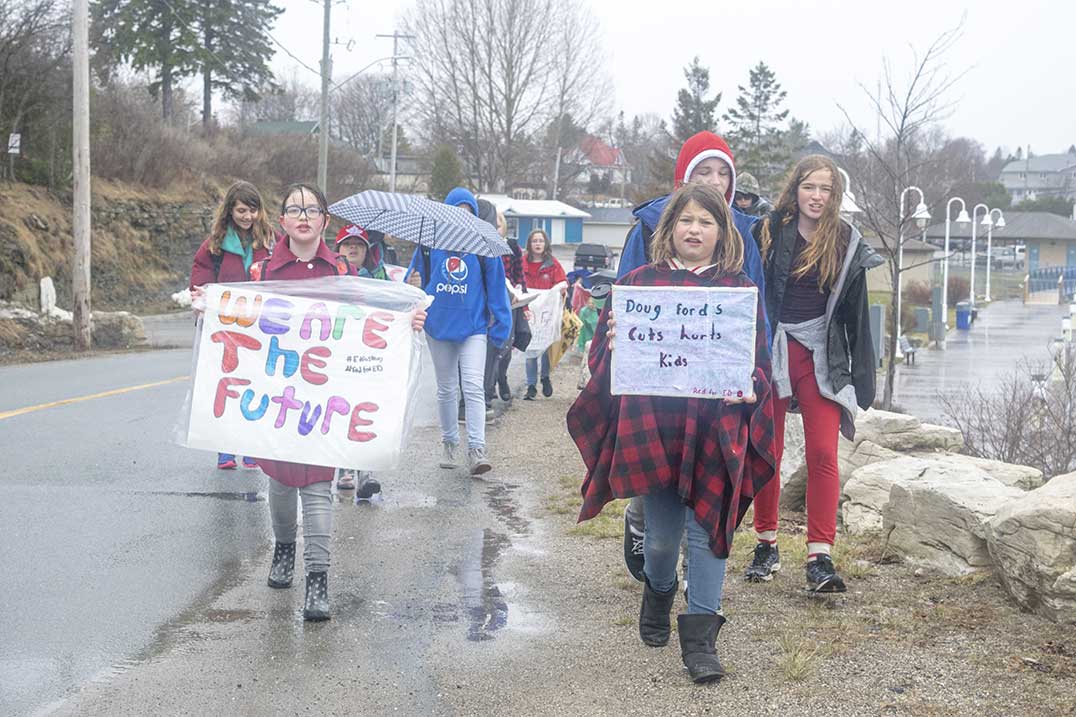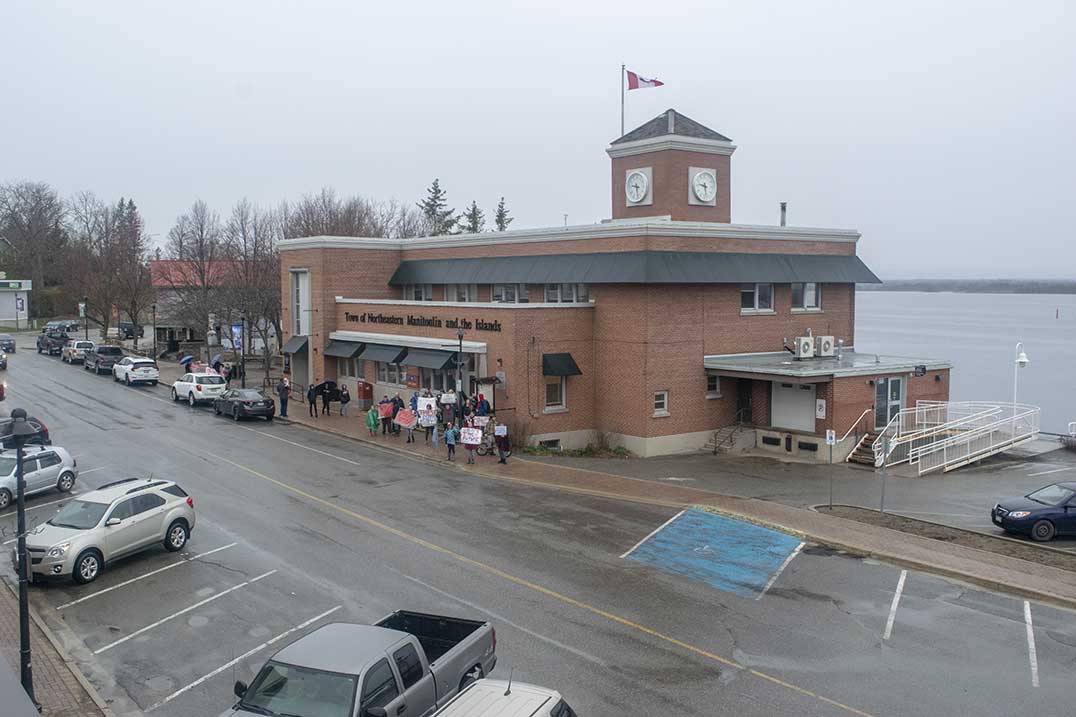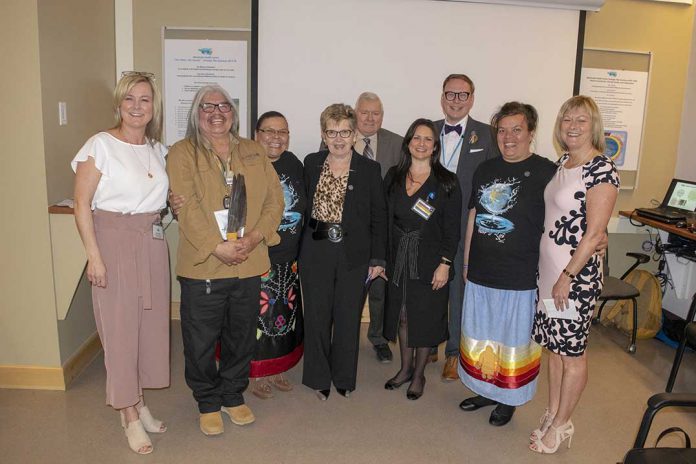LITTLE CURRENT – Under dark skies and relentless rainfall this past Friday, dozens of Little Current Public School (LCPS) students stepped outside with signs and chants ready to protest the Ford government’s cuts to the Ontario education system.
“We were reading about all these terrible things like teachers getting cut out of their full-time jobs and class sizes getting bigger. It’s all going to affect our education—we’re not going to get a proper education,” said Grade 7 student Karlin McGaughey, one of the many organizers of the event.
“If you think of it, less teachers, bigger classes, that’s less one-on-one time with people who might need help,” she added.
Many of the changes expected to come to Ontario’s education system impact the high school level, such as a more than 20 percent increase in average class sizes, reductions in staff numbers and cuts to school funds for programs such as music and special needs.
There are also to be four mandatory online classes during high school, a move that has drawn concern for students who learn best in a classroom or do not have home access to a computer or reliable internet. That is a significant challenge in rural communities such as here on Manitoulin Island, where a truck collision with a fibre optic pole knocked out half the Island’s internet and phone lines on the same day as this student protest.
The students started with a protest in front of the school building, then marched east to Highway 6 where they received no shortage of enthusiastic honks from passing motorists. They followed the main route past the hospital to Worthington St. and then down to Little Current’s downtown street. They climbed the stairs to Turner Park where they paused for a snack break, then made their way back up toward the school. They continued over to Highway 540 for some additional protests before calling it a day.
The LCPS movement grew organically. A few students started talking about some of the upcoming changes and more students slowly joined in. Soon, a group of nine Grade 6 and 7 students—Karlin, Carson Beauchamp, Dale Ballinger, Hailey Diebolt, Raven Joncas, Anika Smith, Hannah Gordon, Evan Moggy-Buie and Jordan Goddard—had joined forces to mobilize the movement.

“These are the people that, they took all of their recesses to work on the signs and work on the chants and work on our route; and calling the mayor and emailing (the press) and all that,” said Karlin.
The LCPS walk-out took place a few weeks later than the province-wide movement on April 4. These students said they heard of another walk-out taking place on April 30 but then heard of the movement of people wearing red clothing on Fridays in support of teachers, a campaign called ‘Red for Ed.’
The students said they decided to co-ordinate it with that movement and that there were a lot of events at school on the 30th, so the date of Friday, April 26 made the most sense.
“A lot of people that don’t go to school anymore and aren’t teachers, they have no idea how this is affecting us and they think we’re yelling about nothing,” said Karlin. “If you go to school, you understand these changes and how we need them to stop.”
The students received some community support in the form of parent Leslie Neshkiwe and Northeast Town Mayor Al MacNevin.
“They phoned me up a couple weeks ago,” said Mayor MacNevin. “How do you say no to a group of radical students from Little Current Public School?”
He added that the last time he had been involved with any sort of student protest was back in the 1970s, and that the protest had been confined to the front doors of the building.
“I always find it interesting when students stand up for something they find important,” he said.
Ms. Neshkiwe added that from a parent’s perspective, the changes to Ontario’s education system are especially concerning.
“I think this is wrong, what (Premier Doug Ford) is doing. Because there are some students who have a little bit of a challenge in school and it affects the children,” she said.

Ms. Neshkiwe’s daughter has recently been diagnosed with ADHD, a condition that requires special attention in a school setting.
“She needs that extra support. I’m scared; I’m worried,” she said.
The student organizers said they were concerned for their high school years if the major changes at the secondary school level took effect.
“A lot of movies like to say that high school’s not a good place, that high school sucks and that kind of stuff. But I feel like if all these changes are being made, then that’s actually going to become a reality. High school is not going to be good for everybody and it’s going to be harder to get through,” Karlin said.
A major rallying point for the students was to show the world that they have a voice and can make an impact in their world.
“Kids can change things. Just because we’re kids, doesn’t mean you can’t do anything to help,” said Hailey.
LCPS principal Christy Case called the group “a dedicated bunch of kids.”
“We do a lot more global awareness initiatives these days, and kids are definitely more aware of what’s going on in the world,” she said. “We’d never encourage them to take on a cause like this, because it would not be appropriate as educators, but we do encourage them to be aware of what is going on in society.”





